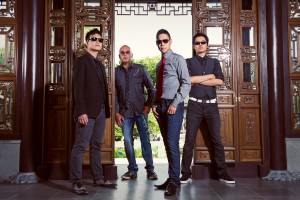Today, the Supreme Court unanimously struck down portions of the Lanham Act, and supported an Asian-American band’s right to an “offensive” trademark.
When the activist Asian-American rock band decided on a name that both affirms their racial identity and reclaims a racist term as a way to challenge stereotypes — The Slants — they likely didn’t expect to end up in front of the Supreme Court. But then the U.S. Patent and Trademark Office (PTO) denied their trademark application. The PTO determined that The Slants were in violation of portions of the Lanham Act, which denies registration to trademarks “which may disparage … persons, living or dead, institutions, beliefs, or national symbols.”
Band leader Simon Tam took the PTO to court, arguing that the band’s First Amendment rights were violated and that the Lanham Act has been used to disproportionately deny trademarks to marginalized communities. After a federal court agreed with the band’s assertions, the PTO appealed to the Supreme Court, which heard arguments in January.
Organizations from both ends of the political spectrum signed on in support of The Slants and their First Amendment rights. CBLDF joined a Cato Institute-led amicus brief to the Supreme Court in Lee v. Tam, asking, “Should the government get to decide what’s a slur?” Among those who joined CBLDF on the brief are satirist P.J. O’Rourke; former ACLU president Nadine Strossen, Flying Dog Brewery (which once sued the state of Michigan over its attempt to stymie the sale of the brewery’s Raging Bitch IPA), and illustrator Ralph Steadman (who drew the label for Raging Bitch).
In the decision, the Supreme Court affirmed that “With few narrow exceptions, a fundamental principle of the First Amendment is that the government may not punish or suppress speech based on disapproval of the ideas or perspectives the speech conveys.”
From the band’s statement on the decision:
After an excruciating legal battle that has spanned nearly eight years, we’re beyond humbled and thrilled to have won this case at the Supreme Court. This journey has always been much bigger than our band: it’s been about the rights of all marginalized communities to determine what’s best for ourselves.
…
For too long, people of color and the LGBTQ community have been prime targets under Section 2(a) of the Lanham Act, simply because we believe in the deliberate disarmament of toxic language and symbols. We’ve had to endure the Trademark Office working in isolation of our groups to navigate the troubled waters of identity politics and shifting language and culture, without any sense of cultural competency, consistency in enforcement of rules, and only giving the benefit of doubt to the most privileged members of society. Now, Americans can decide who should prevail in the marketplace of ideas rather than a lone examining attorney. Oppressed groups will no longer have their identities shaped the sensibilities of dominant ones.
You can read the entirety of The Slants’ statement regarding the decision here.
NPR asked Attorney Lee Rowland of the American Civil Liberties Union for an opinion on the decision:
“The government’s misguided effort to protect minorities from disparagement instead hurt members of that very community by hindering their right to compete in the marketplace of ideas. Fortunately, today’s opinion prevents the kind of absurd outcome that results when the government plays speech police.”
The decision will likely have far-reaching impacts, some of them uncomfortable. As the ACLU, which also filed a brief in Lee V. Tam, writes in its response to the decision:
As with many things under the First Amendment, this decision may lead to uncomfortable results: Products with truly racist or sexist names will (continue to) appear on shelves and a certain Washington football team now undoubtedly gets to retain its own offensive team name, which lost its trademark in 2014 in a decision upheld by lower courts.
Let’s be clear: Unlike in the Slants’ case, there is no cultural reappropriation going on with the NFL team. But there’s no way to lawfully censor speech that offends us without allowing the government the power to censor speech that offends anyone — including The Slants’ band name. When we object to ideas that appear in our marketplace, the default response shouldn’t be to sweep them under a rug and pretend that they aren’t there, but rather call them out, boycott companies that make products that offend us, and ensure our spending reflects our values.
Help support CBLDF’s important First Amendment work in 2017 by visiting the Rewards Zone, making a donation, or becoming a member of CBLDF!
